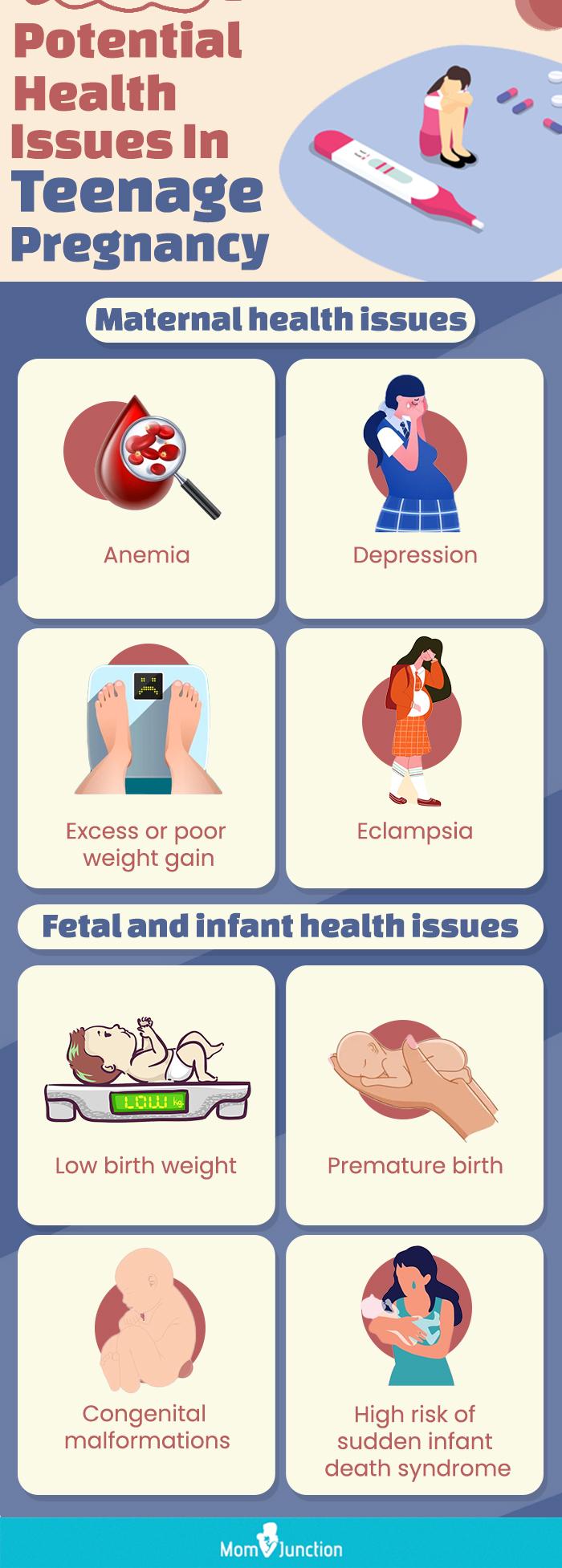
Teenage Pregnancy: A Critical Health Issue
Teenage pregnancy, defined as pregnancy occurring in girls under the age of 20, is a significant public health concern with far-reaching consequences for both the young mothers and their children. This issue disproportionately affects certain populations, including low-income families, minority groups, and those with limited access to healthcare. Understanding the health risks associated with teenage pregnancy is crucial for developing effective interventions and improving outcomes.
Maternal Health Risks
Teenage mothers face a higher risk of various health complications during pregnancy and childbirth compared to older mothers. These risks include:
- Preterm birth: Babies born before 37 weeks of gestation are considered preterm. Preterm birth can lead to serious health problems, including respiratory distress syndrome, cerebral palsy, and developmental delays.
- Low birth weight: Babies born weighing less than 5 pounds 8 ounces are considered low birth weight. Low birth weight is associated with an increased risk of infant mortality, developmental problems, and chronic health conditions.
- Preeclampsia: A condition characterized by high blood pressure and protein in the urine, preeclampsia can lead to serious complications for both the mother and the baby, including seizures, stroke, and placental abruption.
- Anemia: A deficiency of red blood cells, anemia can cause fatigue, weakness, and shortness of breath. It can also lead to premature birth and low birth weight.
- Postpartum depression: Teenage mothers are at an increased risk of postpartum depression, a mood disorder that can develop after childbirth. Postpartum depression can affect the mother’s ability to care for herself and her baby.
Infant Health Risks
Babies born to teenage mothers also face a higher risk of health problems, including:
- Neonatal mortality: Babies born to teenage mothers are more likely to die in the first 28 days of life.
- Infant mortality: Babies born to teenage mothers are more likely to die before their first birthday.
- Developmental delays: Babies born to teenage mothers may experience developmental delays in areas such as language, motor skills, and cognitive function.
- Chronic health conditions: Babies born to teenage mothers are more likely to develop chronic health conditions, such as asthma, obesity, and heart disease.
Social and Economic Consequences
Teenage pregnancy has significant social and economic consequences for both the young mothers and their children. These consequences include:
- Educational attainment: Teenage mothers are less likely to complete high school and pursue higher education. This can limit their earning potential and career opportunities.
- Economic instability: Teenage mothers are more likely to live in poverty and rely on government assistance. They may also face challenges finding stable employment.
- Child abuse and neglect: Children born to teenage mothers are at an increased risk of child abuse and neglect. This can have lasting effects on their physical, emotional, and mental health.
- Intergenerational poverty: Teenage pregnancy can perpetuate a cycle of poverty, as children born to teenage mothers are more likely to become teenage parents themselves.
Risk Factors
Several factors contribute to the risk of teenage pregnancy, including:
- Lack of access to comprehensive sex education: Young people who do not receive comprehensive sex education are less likely to understand the risks of sexual activity and how to prevent pregnancy.
- Peer pressure: Teenagers may feel pressured by their peers to engage in sexual activity.
- Substance use: Alcohol and drug use can impair judgment and increase the likelihood of unprotected sex.
- Mental health issues: Teenagers with mental health issues, such as depression or anxiety, may be more likely to engage in risky sexual behaviors.
- Poverty: Teenagers living in poverty may have limited access to healthcare, education, and other resources that can help them make healthy choices.
Prevention and Intervention
Preventing teenage pregnancy requires a multifaceted approach that addresses both the individual and societal factors that contribute to the problem. Effective interventions include:
- Comprehensive sex education: Providing young people with comprehensive sex education that includes information on contraception, sexually transmitted infections, and healthy relationships can help them make informed choices about their sexual behavior.
- Access to healthcare: Ensuring that teenagers have access to affordable and confidential healthcare, including contraception, is essential for preventing unplanned pregnancies.
- Social support: Providing young people with social support, such as mentoring programs and peer support groups, can help them navigate the challenges of adolescence and make healthy choices.
- Economic empowerment: Addressing the economic factors that contribute to teenage pregnancy, such as poverty and lack of opportunity, can help reduce the risk of unplanned pregnancies.
Conclusion
Teenage pregnancy is a complex health issue with significant consequences for both the young mothers and their children. Understanding the risks associated with teenage pregnancy is crucial for developing effective interventions and improving outcomes. By addressing the underlying factors that contribute to the problem, we can help prevent teenage pregnancy and improve the health and well-being of young people and their families.